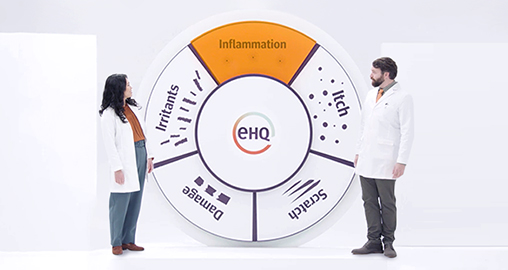When stress gets under your skin
Few things are as stressful for someone with eczema as a flare-up or worrying when the next one will come. We break down the science behind how stress can impact your eczema, and not just the other way around.
Exploring the influence of stress on eczema
Stress is a physical reaction. So, when we experience stressful situations, our bodies still respond the same way as when our ancestors met a bear in the woods—by going into fight-or-flight mode. That physical response to stress makes our bodies produce more stress hormones like adrenaline or cortisol, which can alter the immune system. This is believed to contribute to eczema symptoms.
That’s why it may be helpful to manage your stress levels, in addition to the physical symptoms of eczema.
You can start by recognizing and reducing stress in your life, eating well and exercising, getting enough sleep, and seeking support.



Your eczema, decoded
Prepare for your visit by learning how your doctor might evaluate your eczema symptoms.
Stress busters
Take a deep breath. The HQ Team will help you with a few techniques that may help reduce stress in your life.



Mindful meditation
Research shows that deep breathing, listening to nature sounds or soothing music, reading a book, meditating, and practicing mindfulness can help your body and mind relax. You can find meditation tracks, peaceful music, and nature sounds by searching your favorite streaming music app for playlists.



Bust a move
Exercising is a great way to deal with stress because anything that gets you moving can help with relieving some stress and is believed to trigger neurotransmitters and hormones that improve your mood.



Lean on me
People with positive social connections have been shown to have lower levels of inflammation, which means spending some quality time with friends, loved ones, and pets can actually benefit your health and your eczema. Get connected with others in the eczema community through the
Learn about the connection between












